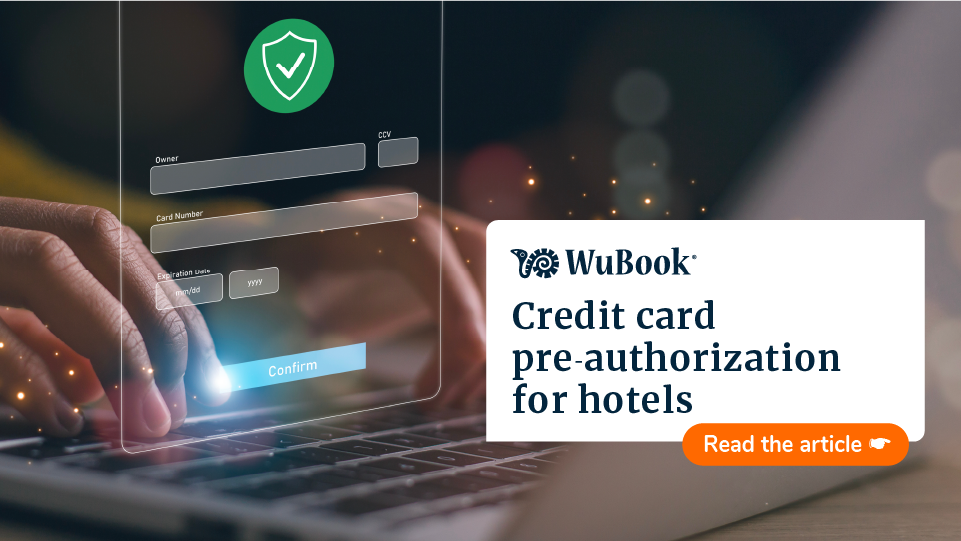Dear WuBookers, online reservations are a great convenience, but they can hold some drawbacks. As remote sales – in time as well as physically – there are many variables at play: what if the customer doesn’t show up? What if the card with which he booked the room is fake? Or doesn’t have sufficient funds available?
That’s why, among the guarantee methods for hoteliers and property managers is credit card pre-authorization: let’s look in detail at what it is and when it’s worth using it.
Card pre-authorization: what it is and how it works
Pre-authorization, as the word itself implies, is a pre-payment authorization, but it does not necessarily coincide with the payment itself.
It is in fact a temporary freeze of money that the hotelier requests in advance, as a guarantee of the reservation. The amount subject to pre-authorization is not transferred from the customer’s account to the hotel (so there is no bank movement), but only “frozen” to ensure its availability before the stay is confirmed.
In other words, it is a form of protection that properties may require, especially for online reservations, to verify the validity of the card data and make sure of the guest’s financial coverage.
Pre-clearance has time limits of usually a few days and, therefore, is requested no more than 7-15 days before payment is due. Too much advance notice, in fact, could generate a conflict with the cancellation policy or could result in the guest being asked for a new pre-authorization. In this regard, if the request for pre-authorization is unsuccessful, another card can be requested from the guest.
But how much is the amount and how to allocate it? There is no fixed rule, and each hotelier can withhold a different amount at their own discretion. For example, it may be equal to the cost of the first night, or that of the cancellation fee, or even a higher amount to cover any damages.
As we have said, pre-authorization in itself does not amount to a charge, but it can turn into one depending on the situation.

Possible scenarios: unfreeze or payment
Let’s assume the case of a customer who has booked a room online with free cancellation within 20 days of the check-in date and has correctly received the pre-authorization request from the hotel.
The main possible scenarios at this point are three:
- the guest confirms the reservation and stays at the hotel.
At this point the hotel can collect the pre-authorized amount, which will then turn into an actual payment (for an equal or lesser amount, never more), and the guest will only have to settle any difference in the total bill.
In this case, the pre-authorization acts as a down payment;
- the guest cancels the reservation within the timeframe of the penalty. The pre-authorization is released: the amount will then be available in the account again in a time that depends on the bank issuing it, the circuit operator, and the method of reversal;
- the guest does not show up (no show) or cancels after the deadline: if cancellation policies allow, the pre-authorized amount can be collected.

The benefits of pre-authorization for hotels and customers
This method of guarantee has many advantages, both for the hotelier and the customer.
The hotelier, as we mentioned, has a way to reduce the risk of fraud by verifying in advance the card’s validity and capacity. Pre-authorization also allows the hotelier to protect himself, at least partially, even if the reservation is not successful by the deadline or if the customer does not show up at all.
On the other hand, from the traveler’s point of view, pre-authorization does not entail any upfront payment constraints, but can be easily converted to a down payment or, vice versa, released in full. Finally, it is important to remember that sensitive data related to payment are not shared, but anonymized thanks to automatic tokenization.

How to manage pre-authorization effectively
As you may have guessed, pre-authorization requires precise and accurate management for each instance and client. In fact, it is important to keep track of when it is requested (remember that it has a limited duration) and within which it can be charged before it is automatically released.
When faced with different rate plans and a large number of online reservations, it is easy for something to slip through the cracks. To prevent this from happening, it is essential to have a hotel PMS that handles pre-authorizations for you.
Zak, WuBook’s property management software for hospitality properties, offers the ability to manage the entire procedure. Thanks to our software you will be able to:
- Set custom rules for pre-authorization (fixed amounts or percentages, maximum number of days to request it before check-in);
- send the request to the customer for them to enter their card details on the dedicated guest page;
- Register and verify the card;
- Withdraw the pre-authorized amount in whole or in part, in just a few clicks;
- Record the payment and manage the accounting.
You will also be able to decide whether to set this as the only method of guarantee or configure multiple alternatives to be offered to your guests.Pre-authorization is a widespread and effective system when managed with the right tools: Zak is one of them.
